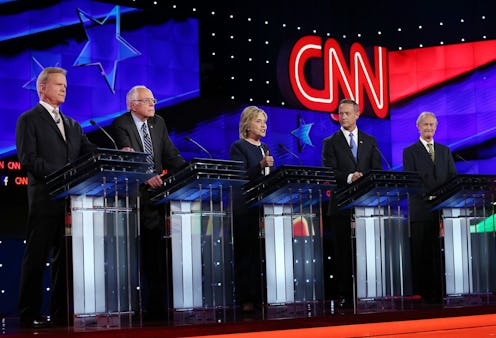News
Which Democratic Candidates Will Drop Out?
The first Democratic debate of the 2016 election cycle has clearly separated a few from the pack, and left some straggling behind. While most expected Hillary Clinton and Bernie Sanders to excel at the podium, Martin O'Malley also stood his ground, making a strong impression on viewers who might not have been familiar with him previously. At the other end of the spectrum, Jim Webb and Lincoln Chafee failed to make a favorable mark when answering questions on the issues. And then there's Lawrence Lessig, whose low poll numbers prevented him from debating at all. With the election heating up and race positions becoming more defined, which Democratic candidate could drop out of the race? (I'm looking at you, Webb, Chafee, and Lessig.)
As expected, both Clinton and Sanders knocked it out of the park overall. She seemed fully prepared to answer any question with ease, and he appeared to galvanize the crowd with every impassioned statement. It might go without saying, but neither Clinton nor Sanders will be going anywhere as they narrow in even closer on that front-runner position. Not far behind them, however, is O'Malley, who was the true surprise of the night. He came off level-headed and compassionate, and his closing remarks about the Democratic party offered a stark contrast to the squabble-filled Republican debate. Don't be surprised if he starts gaining more and more ground in the polls.
But that leaves Webb and Chafee, both of whom more or less squandered their opportunities to make a name for themselves. At one point Webb was noticeably defensive about not getting enough stage time (in fact, he got significantly more time than Chafee), and the most memorable thing that came out of his mouth the whole night might have been about the enemy soldier he killed, which was also awkward.
On the other hand, Chafee might go down in history for bombing a question so hard that people were actually cringing. When asked why he voted to repeal Glass-Steagall, he kept repeating that he had just arrived to the Senate, his dad had just passed away, and it was his very first vote. The inability to think clearly under special circumstances is not a great message you want to send the American people when you're running for president.
Meanwhile, Lessig was barred from making an impression at all, since his poll numbers were below the qualifying one percent. As any past election has illustrated, not appearing in the debate will make a candidate's already long-shot bid even longer, if not impossible.
Given this information, if any Democratic candidate were to drop out of the race, the odds lean toward Webb, Chafee, and Lessig. For Webb, his less-than-confident debate performance was reminiscent of former Republican candidate Scott Walker, who dropped out of the race last month. Walker was a cautionary tale that flubbing answers could be a death knell for one's campaign. Similarly, Rick Perry also exited the race after failing to make much noise at the first undercard GOP debate.
As for Chafee, besides his equally disastrous debate performance, another major reason he might leave the race early is campaign finance. Typically, candidates who struggle with fundraising do not end well in the race. When explaining his decision to drop out, Perry cited the lack of fundraising — which was largely a result of his indictment by a Travis County grand jury — as a main factor. According to a July Politico report, Chafee pulled in less than $30,000 in his first quarter, a paltry sum compared to Clinton's $45 million.
That leaves Lessig, who is currently just too obscure of a candidate to have any plausible hope of securing the Democratic nominee. If he were to drop out, many people might be none the wiser.
